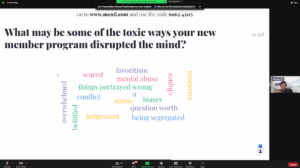SJC Long Island’s Greek Life organizations focused on anti-hazing strategies Wednesday during an interactive virtual event, featuring Sara Lowery, a professional speaker and assistant director of Fraternity and Sorority Leadership & Learning at the University of Delaware.
“Today I’m not going to tell you ‘This is how not to haze’ — you know that, right?” Lowery said to the more than 120 people in attendance at the common hour event. “But hopefully today it will remind you of the importance of making sure that when new members are coming into your presence that you’re giving them the best of you. That you’re making sure that when they come … they are coming to a space where they feel connected, they feel supported, and that they also feel safe.”
Students interacted with Lowery and their peers during the event using the Zoom chat function, and anonymously through the presentation website, menti.com.
SJC’s Office of Student Involvement, Leadership and Intercultural Engagement hosted the event — held in two sessions on Feb. 2. Attendance was mandatory for all members of Green Life organizations.
Taking a Stand Against Hazing
 “Why do some people haze others?” Lowery asked the attendees.
“Why do some people haze others?” Lowery asked the attendees.
Students replied quickly and anonymously.
“They think it’s funny,” one student wrote.
“Because it’s ‘tradition.’ Every other class did it so the new ones should too — or else it’s ‘unfair,'” another added.
Others suggested hazing is used as an “initiation,” a joke, or to gain control over new members.
Lowery applauded the students for identifying types of hazing.
“I know it’s not sexy, but it’s real,” she said. “It’s so real that your state of New York said, ‘I’m going to make sure students understand how real it is and can be’ — so much so, that you have hazing in the first degree and the second degree.”
Most students shared anonymously that they haven’t heard about, or participated in, hazing at SJC Long Island. At the same time, many students also admitted they were unfamiliar with New York state’s anti-hazing laws, which penalizes those who put a person in danger during an initiation into a club or organization.
“I don’t believe — no one believes — that students are setting out to kill other students,” Lowery said. “No one says that. But I do believe that you get caught up. It starts out as funny. You’re not thinking about the opposite end. Then, when it goes too far, folks get scared and are not sure what to do.”
She referenced the story of Tim Piazza, a former Penn State student who died due to reckless fraternity hazing in 2017. His death inspired anti-hazing legislation in New Jersey and Pennsylvania.
Closing the event, Lowery left students with advice: If you see hazing or hear about it, report it.
“Don’t feel like a snitch,” she said. “Be the responsible leader you are. Make sure your community has everything that it needs and that you are keeping everyone safe. “
Important Resources to Report Hazing:
Hugo Morales
Assistant Director of Student Involvement Leadership and Intercultural Engagement
Greek Life Advisor
hmorales@sjny.edu
Bryan Gill
Executive Director of Student Involvement Leadership and Intercultural Engagement
bgill@sjny.edu
Janelle Hill
Associate Vice President for Student Life
jhill3@sjny.edu
National Anti-Hazing Toll-Free Hotline
888.NOT.HAZE

